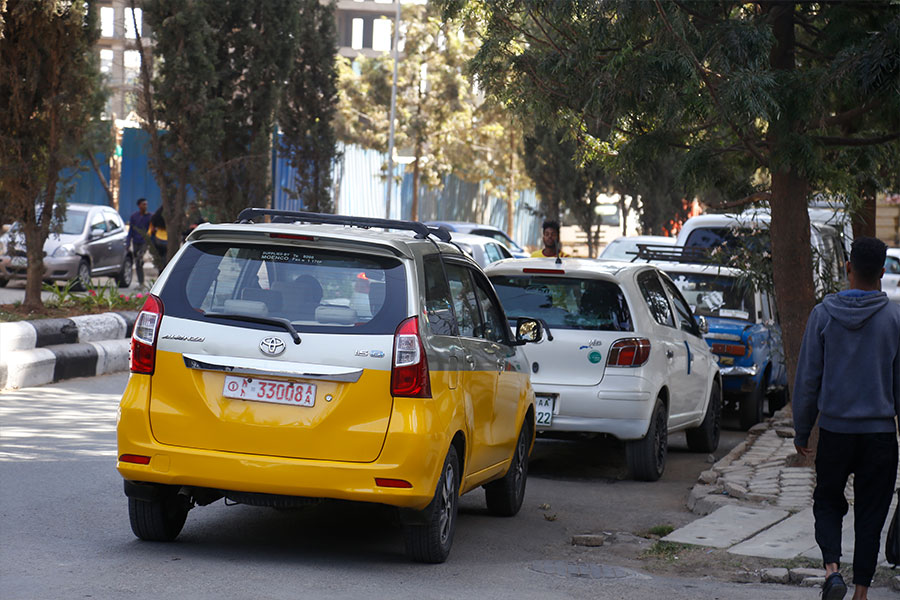
Fortune News | Feb 23,2019
Tenants of two historical structures in Piassa, Addis Abeba, breathed a sigh of relief after being granted assurance that their names are not included on the list of properties slated for demolishment. The buildings house Lion Pharmacy and Neon Addis, on Mahatma Gandhi Street, off Churchill Avenue.
Tenants of the two buildings received a letter a few weeks ago from the City's Culture & Tourism Bureau, pledging that the structures will not be demolished to give way to new development. They had been notified by officials of Woreda 01, under the Arada District, to vacate the properties despite the buildings having been registered as heritage sites since 2019.
There was a plan by the previous administration to clear the area to make way for the capital's beautification project but the current administration later dropped it, sources said.
Neon Addis Plc supplies neon light advertising fixtures, in business for decades from its office in the 112-year-old building.
"I don't understand why they always try to provoke us," said Kidist Getachew, general manager of Neon, referring to the officials whom she claims pestered her to abandon the building. "We can't even plan on an expansion or enhance our business."
Lion Pharmacy is a family business operating since 1959, reputed to have been the first modern pharmacy in Ethiopia.
Fasika Kebede, the owner of Lion Pharmacy, says her establishment is a city landmark as well as an important contributor to the country's health service provision and the history of pharmacy in Ethiopia.
"Facing the threat of removal from our premises has become the norm, particularly at the end of each year," she said.
The threat of eviction has been recurring for eight years.
The Addis Abeba City Culture, Arts & Tourism Bureau, under Faiza Mohammed, has increasingly been at loggerheads with officials in charge of other bureaus in the city administration over the demolitions of buildings it designates as having historical heritages.
Earlier this month, tenants of the Bego Adragot Building, constructed during the five-year Italian occupation in the 1930s, were told to vacate their premises after six years of dispute over the historical value of the property. The building, which housed Shi Solomon Supermarket, Lion Bar, Yohanis Jewelry, and the Picnic Basket Restaurant, is now on the brink of being demolished to make way for the expansion of Ethiopia Hotel.
Members of the Heritage Trustee Board and other pundits have expressed their apprehension about the threats of demolition facing historical sites in the capital. Historical heritage, symbolic buildings, street patterns, and street-building interactions are essential factors that give a city its identity. Yet the City Administration is not giving the issue the attention it deserves, according to Kidist Driba, an architect.
"The Administration should always be mindful in the planning and re-planning of Addis Abeba," Kidist said.
A building over 50 years old can be considered a heritage site depending on its historical and architectural significance, according to Mekbib Gebremariam, a senior heritage expert at the Addis Abeba City Culture, Arts & Tourism Bureau.
"Some heritage sites have already been demolished carelessly," said Mekbib. "However, we have the mandate to keep these intact and we won't allow it to happen again."
Arada District is the oldest part of Addis Abeba and grew around the first hotel in the city, the Taitu Hotel.
BERSABEH GEBRE HAS CONTRIBUTED TO THIS STORY.
PUBLISHED ON
[ VOL
, NO
]

Radar | Feb 05,2022

Fortune News | Jul 02,2022

Fortune News | Mar 21,2020

Radar | Nov 07,2020

Featured | Apr 06,2024

Dec 22 , 2024 . By TIZITA SHEWAFERAW
Charged with transforming colossal state-owned enterprises into modern and competitiv...

Aug 18 , 2024 . By AKSAH ITALO
Although predictable Yonas Zerihun's job in the ride-hailing service is not immune to...

Jul 28 , 2024 . By TIZITA SHEWAFERAW
Unhabitual, perhaps too many, Samuel Gebreyohannes, 38, used to occasionally enjoy a couple of beers at breakfast. However, he recently swit...

Jul 13 , 2024 . By AKSAH ITALO
Investors who rely on tractors, trucks, and field vehicles for commuting, transporting commodities, and f...

Jul 5 , 2025
Six years ago, Ethiopia was the darling of international liberal commentators. A year...

Jun 28 , 2025
Meseret Damtie, the assertive auditor general, has never been shy about naming names...

Jun 21 , 2025
A well-worn adage says, “Budget is not destiny, but it is direction.” Examining t...

Jun 14 , 2025
Yet again, the Horn of Africa is bracing for trouble. A region already frayed by wars...